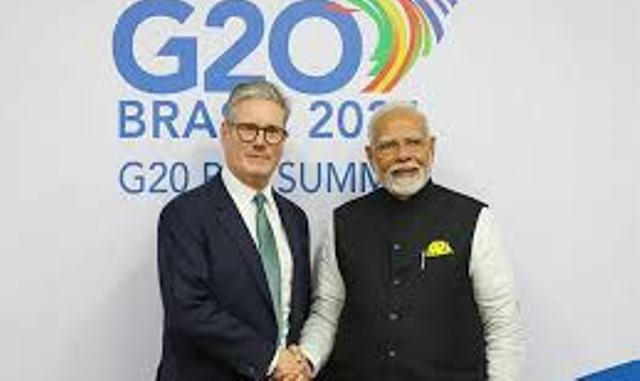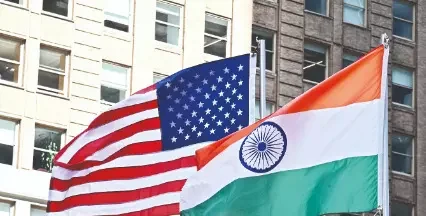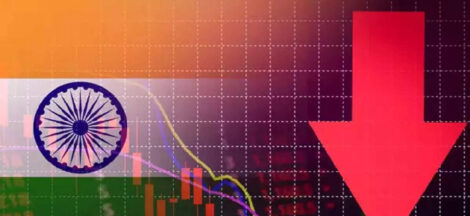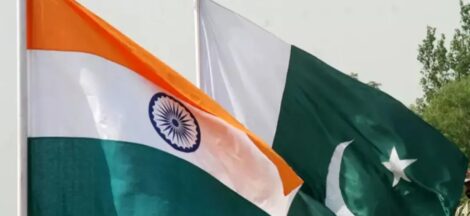NEW DELHI: India and the United Kingdom are poised to resume talks for their proposed Free Trade Agreement (FTA) in early 2025. This follows an announcement by British Prime Minister Keir Starmer after a bilateral meeting with Indian Prime Minister Narendra Modi at the G20 Summit in Brazil. The resumption of trade discussions comes after a pause in talks due to political transitions in both countries, but the two leaders have reaffirmed their commitment to a comprehensive and mutually beneficial agreement.
The India-UK FTA negotiations initially began in January 2022, marking a significant step in strengthening bilateral economic ties. However, the process has faced delays, notably with the 14th round of talks stalling in the wake of both nations entering their respective election cycles. Despite these setbacks, the momentum for the FTA has remained strong, underscored by the recent pledge from both countries to accelerate the discussions.
Following their meeting on the sidelines of the G20 Summit in Rio de Janeiro, the UK government confirmed that trade negotiations will resume in the new year. On Wednesday, the Indian Ministry of Commerce welcomed this announcement, emphasizing that both countries are committed to working together to address the remaining issues and ensure a balanced and forward-looking agreement. “We look forward to closely working with the UK’s negotiating team to address remaining issues to mutual satisfaction,” stated the Ministry in an official statement.
The proposed India-UK FTA covers a broad range of areas, with 26 chapters under discussion, including goods, services, investments, and intellectual property rights. Both countries have identified specific sectors where they seek mutual benefits.
India’s industry is particularly focused on securing better access for its skilled professionals, especially in sectors like IT and healthcare, in the UK market. Additionally, India is seeking market access for several goods at nil customs duties, an issue that remains pivotal in the negotiations. On the other hand, the UK is looking for greater access to the Indian market, especially in sectors such as scotch whiskey, electric vehicles, and lamb meat. The UK is also pushing for a reduction in import duties on certain luxury items like chocolates and confectionary goods.
Another important aspect of the talks involves services. The UK is keen to increase its presence in the Indian market across various service sectors, including telecommunications, legal services, and financial services such as banking and insurance. Both nations are also negotiating a bilateral investment treaty (BIT), which aims to enhance the flow of investments between the two economies.
India’s trade relationship with the UK has seen consistent growth in recent years. In the fiscal year 2023-24, bilateral trade between the two countries increased to USD 21.34 billion, up from USD 20.36 billion in the previous year. This growth is supported by a strong export performance, with India’s exports to the UK reaching USD 7.32 billion in the first half of 2024—an increase of 12.38 percent compared to the same period in 2023.
The primary commodities in India’s export basket to the UK include mineral fuels, machinery, precious stones, pharmaceuticals, apparel, iron and steel, and chemicals. These items collectively account for 68.72 percent of total exports, highlighting the significant contribution of these sectors to the trade relationship. As India continues to make strides toward its ambitious export target of USD 1 trillion by FY30, the UK remains a priority market, with exports expected to reach USD 30 billion by 2029-30.
The upcoming resumption of FTA talks is expected to bring both countries closer to finalizing the agreement. The discussions will focus on bridging the gaps that exist in areas such as trade in goods and services, investment flows, and regulatory frameworks. Given the progress already made in the negotiations, both parties are optimistic about the potential for a timely conclusion.
The UK’s announcement to resume negotiations is not only a reflection of the growing economic relationship between India and the UK but also a broader recognition of the strategic importance of this partnership. As both countries look to deepen their engagement, the successful completion of the FTA will likely serve as a cornerstone for future collaboration in a wide array of sectors, ranging from technology and innovation to trade and investment.
Source: The Financial Express




 Services Exports To Outgrow Merchandise By FY30: GTRI
Services Exports To Outgrow Merchandise By FY30: GTRI 